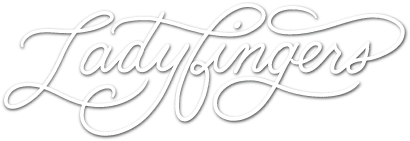Printing and Production Methods
Hand Lettering
You may be wondering, "What is
the difference between calligraphy and hand-lettering?" While calligraphy is the art of handwriting, hand lettering
is the art of drawing letters. Ladyfingers co-founder, renowned lettering artist and instructor Arley Torsone likes
to describe hand lettering as "drawing letters with character" (ba-dum-ching!). With hand lettering, you are
able to give your words a rhythm and a liveliness that typefaces alone cannot achieve. Hand
lettering creates an original and one-of-a-kind look and feel, since every ;word is drawn to
fit the voice of the project.
Digital Printing
The world of color printing is
at your (lady) fingertips! We are able to achieve a wide spectrum of colors to create a robust and vibrant
design. Our full-color professional-grade digital prints are made on state-of-the-art modern presses,
offering both flexibility and quality.;
Letterpress Printing
Originating in the 1400's, letterpress printing is a timeless method where paper is pressed into a relief printing surface,
leaving a tactile, handmade feel. In our shop, we print using a Chandler and Price platen press from 1904, a
Vandercook 219 that originated in 1927, and a Miehle Vertical that was introduced in 1940. We print using polymer
plates, which gives us flexibility in our designs without sacrificing quality. Every sheet of paper is hand-fed into
our presses by trained letterpress technicians, who monitor ink levels, impression and registration with an
experienced eye.
Foil Stamping
Foil Stamping is a printing
technique where a roll of foil is pressed into a heated metal relief printing surface, causing the foil to adhere to
the paper. The foil is often shiny but can also be matte, and often has a debossed feel since the metal plate
is pressed into the paper.
Die Cutting
Close your eyes and imagine in
your mind a cookie cutter. Got it? Now instead of cutting dough, replace it with a sheet of paper. Dies are
fabricated by bending a sharpened blade into a desired shape. Dies can be mounted to a press so that a repeated
shape can be consistently achieved. Usually we create a die when there is a large quantity that needs to be cut to a
certain shape.
Laser Cutting
Sometimes we encounter shapes that are better suited to be cut by a laser than a metal die. Laser cutting involves—you guessed it—a laser, which burns a thin line into a sheet of paper without catching the entire piece of paper on fire, which is a good thing! We use laser cutting on thicker papers or boards, more intricate designs, or smaller jobs where getting a metal die fabricated is unnecessary.
...and Beyond!
We have been known to
collaborate with other artists and craftspeople who utilize a number of production techniques
to achieve specialized results, most notably with our line of Commissioned Invitations. In the past we have
enlisted carpenters to create individual boxes with
sliding covers made from reclaimed wood from the area where the wedding was to take place,
leatherworkers to design and hand-sew small leather pouches that contained elements of a wedding
invitation, robotics engineers to create a chip that plays a custom recording when an invitation is
opened, a seamstress to sew sailcloth into envelopes on an industrial sewing machine for an event celebrating a
worldwide ocean race, and the list goes on! As artists and craftspeople ourselves, we enjoy the thrill of a creative
challenge and always find a way to bring a dream into a reality.

